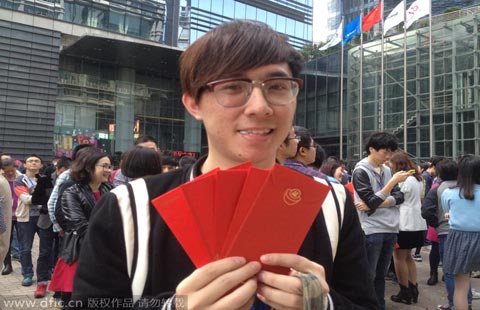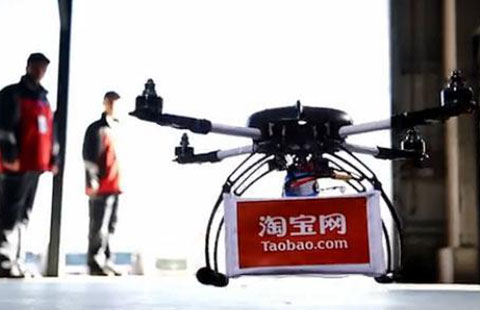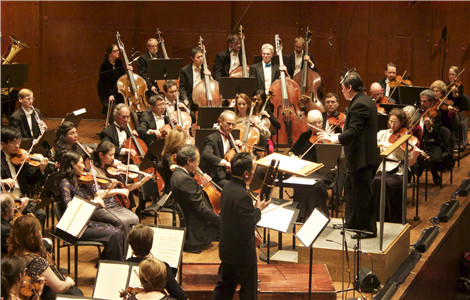Why China's youth is getting the needle
Updated: 2015-02-26 07:26
By Peng Yining(China Daily)
|
||||||||
Although tattoos have long been fashionable in Western countries, Chinese society has always looked askance at an artform primarily associated with criminals and gang members. Now things are beginning to change, as Peng Yining reports.
Propelled forward by the people behind her, Chang Huan finally got onto the crammed 397 bus. The rear door slapped against her back as it closed, and there was no room to turn around because her backpack was pressed tight against the glass door.
It was 7 am outside Beijing's East Fifth Ring Road, about 20 km from the downtown area, and people were already lining up along the street, quietly filing past stands selling soy milk and dumplings.
|
Top: Cao Chen (right) works on a client's arm in his parlor in Beijing. Above: Chang Huan, a graphic designer and fledging tattoo artist, inks her own design on a customer's arm. Tattoos are still frowned upon by mainstream society in China, but that isn't deterring younger people. Photos by Wang Zhuangfei / China Daily |
Beijing's massive public transport system carries more than 17 million people from home to work every day, and on Chang's bus the commuters all wore the same expression: drowsy, indifferent and numb.
Dressed in a white shirt and loose-fitting sweater, Chang looked identical to the office workers around her until she stretched forward to take hold of the nearest hand grab and the sleeve of her sweater rode up to display three colorful tattoos - an owl, a stag and a goldfish - that cover her lower right arm from the elbow to the wrist.
"People always look at me with surprise when they see my tattoos, and that moment makes my day. I feel I am different. Different from the gloomy crowd on the bus," the 25-year-old graphic designer said.
Chang, a quiet woman with long straight black hair and a sweet smile, said her job mainly involves designing ad inserts for a clothing company, which "doesn't need much creativity. That company could replace me with just about anyone".
When she told her colleagues that she was going to get some tattoos, they said "No way!" and laughed. "One day, I walked into my office wearing a T-shirt, and showed them my tattoos," she said. "I saw their jaws drop and I never felt more alive."
Born and raised in Yueyang, a city in Hunan province, Chang came to Beijing in search of "a better future" in 2009. "I didn't know anyone in the city, so every time I saw a young person with tattoos, it was like finding one of my kind," she said.
Her first tattoo, a snow flake on her lower left arm, was quickly followed by a series of animals on her lower right arm. Now, she's planning to have a female profile and a tiger tattooed high on her right arm to represent her mother and father.
Chang, who is also a fledging tattoo artist, makes about 6,000 yuan ($961) a month, which she said isn't enough to buy an apartment or a future in the capital: "Getting a tattoo is painful, but it reminds me that I exist. If I died suddenly, people would know the body was mine when they saw my tattoos."
Loss of identity
Urbanization continues at a scorching pace in China. According to figures from the National Bureau of Statistics, by the end of last year, 54.77 percent of the population was living in urban areas. That's a huge jump from the 26 percent recorded in 1990, when 253 million people left their hometowns and moved to big cities such as Beijing and Shanghai in search of opportunities.
But as the urban population and prosperity have risen in tandem, people have been forced to contend with a range of problems, including traffic congestion, skyrocketing home prices and choking air. For many younger people, those factors are compounded by feelings of alienation and loss of identity, emotions that have seen the popularity of what was once a rebel subculture soar.
Opposition to tattoos has been deeply ingrained in the Chinese psyche for millennia. In ancient China, tattooing was considered a barbaric practice, and it also was common for convicted criminals to be branded on the face with a character such as Qiu, or "prisoner".
In the classic novel The Outlaws of the Marshes, also known as The Water Margin, several of the main characters are described as having tattoos that cover their entire bodies. Although there have been positive stories about tattoos - including that of Yue Fei, a general during the Song Dynasty (960-1279), who had one that read "Repay the County with Pure Loyalty" - mainstream society still views them as a sign of a rebellious nature.
Financial tiger
Liu Hongliang got his first tattoo in 2007 when he was working at a securities house in Beijing. In common with many others in the financial industry, he always wore a starched white shirt, had well-polished shoes, and used gel on his delicately styled hair. He said the market was booming before the 2008 global financial crisis, and, as a recent financial studies graduate, the monthly salary of 20,000 was very attractive.
"But I wasn't happy," the 29-year-old said. "As a tiny cog in a big firm, my life was depressing."
His employer imposed a strict dress code, and although Liu had excellent eyesight, he was forced to wear a pair of fake eyeglasses to "look more professional and likeable" and attract a larger number of clients.
At work, Liu frequently discussed business with bankers over dinner in high-end restaurants, but his personal life wasn't quite so luxurious. "I worked with rich people all the time, but I wasn't rich. I rode the bus to those restaurants," he said. "You have no idea how hard it was to prevent my starched shirt from getting creased in a crammed bus."
He also felt trapped in his cubicle, next to hundreds of other cubicles that housed hundreds of colleagues, all dressed in white shirts, black shoes and, sometimes, fake eyeglasses.
Eventually, Liu had a tattoo of a tiger, his animal birthsign according to the Chinese zodiac, on his right shoulder a short while after his 22nd birthday. He was careful to ensure that the tattoo was a few centimeters higher than the bottom of his T-shirt sleeve so it wouldn't be visible, even during summer.
"My tattoo is the only thing that will go into the coffin with me, not my money, not my house," he said. "It represents the real me."
The tattoo took four, painful hours, and Liu proudly returned to his work cubicle with his tiger. He said the environment hadn't changed, but he knew he had because the tattoo made him feel like a winner.
Wang Mingdi has a similar feeling. "I know it crosses the line, but having a tattoo brings me the joy of secretly breaking the rules," he said.
The 27-year-old designer at an underwear company had his first tattoo, a scantily dressed woman, on his right calf when he was in college. He said he has fantasized about the worlds depicted in gangster movies and rock music since childhood, but he's just an ordinary white-collar worker.
To all intents and purposes he's a "normal" member of society. Every day he undertakes the 60-minute commute to his office in a glass-walled, high-rise building in one of Beijing's busiest districts. He punches the clock, pays his taxes, visits his parents on important holidays, has been in a relationship for seven years, and is preparing to get married.
"But deep inside of me, I want to be different, I want to have something other people don't have," he said. "In the past, being different was a sin, but now, as China develops, being different is cool."
Last year, he had new tattoos on his left arm that show a burning church, a blonde woman, and demons - all inspired by tattoos flaunted by Western rock stars - and also a small pencil sharper on his wrist because he uses one all the time in his design work. He hasn't told his parents, both high school teachers, about his tattoos. "I don't think they would understand," he said.
Cao Chen, a tattooist in Beijing, said society's continuing disapproval of tattoos hasn't stopped people from "getting inked". Cao's parlor, about 2 kilometers south of the CBD area of Guomao, is visited by more than 300 customers every year, mostly white collar workers aged 25 to 35.
Cao has pinned examples of his work on the wall of his parlor, including a big-eyed deer, several bleeding skulls, and the Monkey King, one of the great figures of Chinese literature and a favorite among his male customers.
As the main character in the classic Journey to the West, the Monkey King used his immense strength and intellect to rebel against Heaven, and has long been seen as the Chinese version of a superhero.
"Very few people have tattoos just to be cool - instead, they want to immortalize memories, their loved ones, and their own identities," Cao said. "We help them to design a unique image that will help to define them."
Contact the writer at pengyining@chinadaily.com.cn
(China Daily 02/26/2015 page5)

 Chengdu citizens visit Du Fu Thatched Cottage to mark Human Day
Chengdu citizens visit Du Fu Thatched Cottage to mark Human Day
 Tencent gifts red envelopes to employees
Tencent gifts red envelopes to employees Throwing coins to please God of Wealth
Throwing coins to please God of Wealth
 7 companies that aim to fly high with drone deliveries
7 companies that aim to fly high with drone deliveries
 Starry Night created by lens
Starry Night created by lens
 Dragons, martial arts and basketball
Dragons, martial arts and basketball
 Stringing in the New Year
Stringing in the New Year
 Top 10 Chinese innovators in 2014
Top 10 Chinese innovators in 2014
Most Viewed
Editor's Picks

|

|

|

|

|

|
Today's Top News
Obama blames immigration woes on Republicans
New fighter jet appears ready for PLA
Why China's youth is getting the needle
Most Chinese forced to return home were living abroad illegally
US State Dept calls for cyber security boost
Anbang buys new piece of Manhattan
California here we come: Chinese
Port dispute over, shelves take time to restock
US Weekly

|

|
